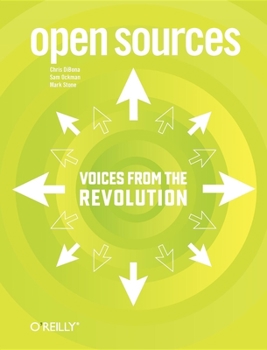Open Sources: Voices from the Open Source Revolution
Select Format
Select Condition 
Book Overview
Freely available source code, with contributions from thousands of programmers around the world: this is the spirit of the software revolution known as Open Source. Open Source has grabbed the computer industry's attention. Netscape has opened the source code to Mozilla; IBM supports Apache; major database vendors haved ported their products to Linux. As enterprises realize the power of the open-source development model, Open Source is becoming a viable mainstream alternative to commercial software. Now in Open Sources, leaders of Open Source come together for the first time to discuss the new vision of the software industry they have created. The essays in this volume offer insight into how the Open Source movement works, why it succeeds, and where it is going. For programmers who have labored on open-source projects, Open Sources is the new gospel: a powerful vision from the movement's spiritual leaders. For businesses integrating open-source software into their enterprise, Open Sources reveals the mysteries of how open development builds better software, and how businesses can leverage freely available software for a competitive business advantage. The contributors here have been the leaders in the open-source arena: Brian Behlendorf (Apache) Kirk McKusick (Berkeley Unix) Tim O'Reilly (Publisher, O'Reilly & Associates) Bruce Perens (Debian Project, Open Source Initiative) Tom Paquin and Jim Hamerly (mozilla.org, Netscape) Eric Raymond (Open Source Initiative) Richard Stallman (GNU, Free Software Foundation, Emacs) Michael Tiemann (Cygnus Solutions) Linus Torvalds (Linux) Paul Vixie (Bind) Larry Wall (Perl) This book explains why the majority of the Internet's servers use open- source technologies for everything from the operating system to Web serving and email. Key technology products developed with open-source software have overtaken and surpassed the commercial efforts of billion dollar companies like Microsoft and IBM to dominate software markets. Learn the inside story of what led Netscape to decide to release its source code using the open-source mode. Learn how Cygnus Solutions builds the world's best compilers by sharing the source code. Learn why venture capitalists are eagerly watching Red Hat Software, a company that gives its key product -- Linux -- away. For the first time in print, this book presents the story of the open- source phenomenon told by the people who created this movement. Open Sources will bring you into the world of free software and show you the revolution.
Format:Paperback
Language:English
ISBN:1565925823
ISBN13:9781565925823
Release Date:February 1999
Publisher:O'Reilly Media
Length:280 Pages
Weight:1.25 lbs.
Dimensions:0.7" x 7.0" x 9.2"
Customer Reviews
3 ratings
Very informative and interesting.
Published by Thriftbooks.com User , 25 years ago
Open Sources: Voices from the Open Source Revolution is an extremely interesting book about Open Sourcing in the real world consisting of essays by the people on the inside of the Open Source revolution.
Standing on the shoulders of the Giants
Published by Thriftbooks.com User , 25 years ago
After reading some of the essays at OpenSource.org I wanted further background on how all these great pieces of software came about and where they are going. This book tells you how it all happened and gives some good perspective on how things are working. Some things I learned: 1) i'll use GNOME and -not- KDE, 2) Stallman and Wall are nuts, 3) openSource may not conquer end-user apps (read behlendorf's essay), and 4) cygnus took care of the crown jewels. Thank you to Perens and Raymond for changing the language of free software into the more digestible "opensource" and I look forward to helping contribute to opensource projects myself.
Important for business, important for programmers
Published by Thriftbooks.com User , 25 years ago
Disclaimer: I got the book for free and never would have paid for it. That said, it is the most important book I have read in several years. The criticisms below, valid as they occasionally are, do not detract from the relevance of this book to every programmer and business person. Some essays, like the one on the history of UNIX are very boring, but provide the necessary historical context to understand the approaches that have succeeded and failed in the past. I knew nothing substantial about Open Source a few weeks ago. This is an excellent primer for someone who wants to understand it without getting into a flame war on a mailing list (one such flame is included in the book as an Appendix).Even if you hate some of the essays, you'll find plenty to love, especially those chapters on OpenSource business plans from Cygnus, RedHat, and Brian Behlendorf of Apache.This books covers everything from history, to zealotry, to business, to licensing, to engineering, to hackers, to the future. You'll find parts you agree with and parts you vehemently disagree with. That said, it will stimulate you to think about the coming tidal wave. Ignore it at your own risk.





